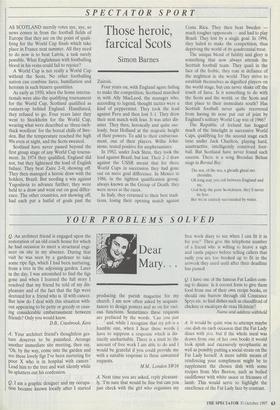SPECTATOR SPORT
Those heroic, farcical Scots
Simon Barnes
AS SCOTLAND merrily votes aye, aye, so news comes in from the football fields of Europe that they are on the point of quali- fying for the World Cup finals which take place in France next summer. All they need to do now is to beat Latvia, a task surely possible. What Englishman with footballing blood in his veins could fail to rejoice?
A World Cup is not really a World Cup without the Scots. No other footballing nation can combine farce, humiliation and heroism in such bizarre quantities.
As early as 1950, when the home interna- tionals were also the qualifying tournament for the World Cup, Scotland qualified as runners-up behind England. Humiliated, they refused to go. Four years later they went to Stockholm for the World Cup, wearing what were described as 'three-inch- thick woollens' for the boreal chills of Swe- den. But the temperature reached the high 90s even at night, and the Scots sweated.
Scotland have never passed beyond the first group stage of any World Cup tourna- ment. In 1974 they qualified, England did not, but they lightened the load of English failure. They beat Zaire 2-0, showing off. They then managed a heroic draw with the holders, Brazil. But needing a win against Yugoslavia to advance further, they were held to a draw and went out on goal differ- ence. The other countries, not showing off, had each put a hatful of goals past the Zairois.
Four years on, with England again failing to make the competition, Scotland marched in with Ally MacLeod, the manager who, according to legend, thought tactics were a kind of peppermint. They took the lead against Peru and then lost 3-1. They drew their next match with Iran. It was utter dis- aster. They then, heroically and quite use- lessly, beat Holland at the majestic height of their powers. To add to their embarrass- ment, one of their players, Willie John- stone, tested positive for amphetamines.
In 1982, under Jock Stein, they took the lead against Brazil, but lost. Then 2-2 draw against the USSR meant that for three World Cups in succession they had gone out on mere goal difference. In Mexico in 1986, in the tightest qualification group, always known as the Group of Death. they were never at the races.
In Italy, they returned to their best tradi- tions, losing their opening match against Costa Rica. They then beat Sweden much tougher opponents -- and had to play Brazil. They lost by a single goal. In 1994, they failed to make the competition, thus depriving the world of its quadrennial treat.
The unique blend of futility and glory is something that now always attends the Scottish football team. They quail in the face of the feeble, they roar in defiance of the mightiest in the world. They strive to establish themselves as dignified players on the world stage, but can never shake off the touch of farce. Is it something to do with the Scots and the world, or the Scots and that place to their immediate south? Has Scottish football never quite recovered from having its nose put out of joint by England's solitary World Cup win of 1966?
The Republic of Ireland has hogged much of the limelight in successive World Cups, qualifying for the second stage each time under Jack Charlton, playing hard, unattractive, intelligently contrived foot- ball. But Scotland have never found such success. There is a song Brendan Behan sings in Borstal Boy
The sea, of the sea, a ghradh gheal mo chroidhe.
Oh long may you roll between England and me, God help the poor Scotchmen, they'll never be free.
But we're entirely surrounded by water.


































































 Previous page
Previous page